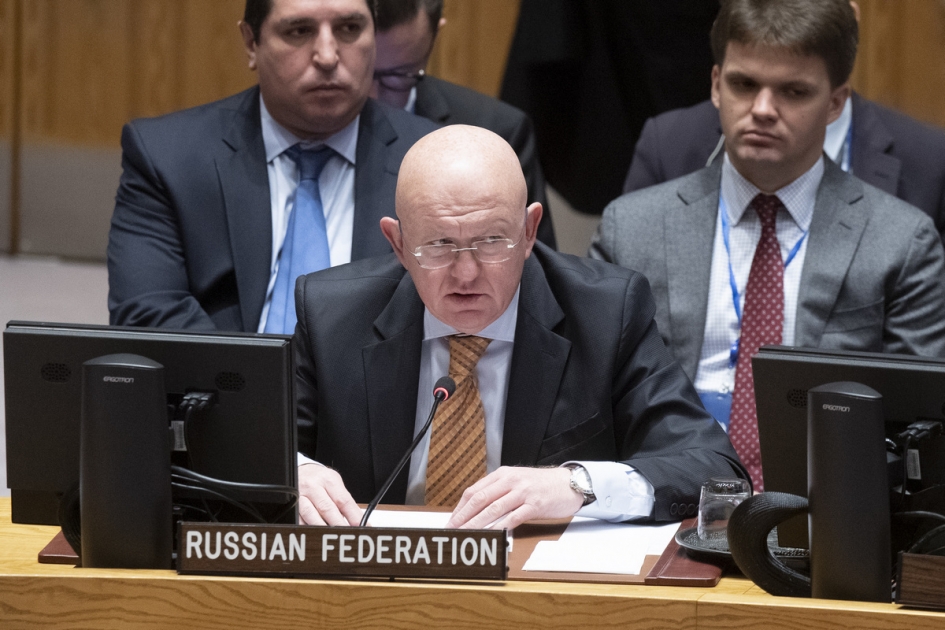Statement by Ambassador Vassily A. Nebenzia, Permanent Representative of the Russian Federation to the United Nations, at the Security Council meeting on the situation in Yemen
We are grateful to the Special Envoy of the Secretary-General, Martin Griffiths, for his detailed briefing on the recent round of intra-Yemeni consultations held in Sweden, as well as to UnderSecretary-General Mark Lowcock for his overview of the humanitarian situation in the Republic of Yemen.
We thank the Government of Sweden for its assistance in preparing and holding these extremely important negotiations, and we welcome the new Permanent Representative of Yemen to the United Nations. Like many other members of the Security Council, we would like to believe that in the light of the agreements arrived at in Stockholm, we are entering a new stage in the conflict in Yemen.
We hope that through further concerted efforts we can establish a ceasefire throughout the country and help the millions of Yemeni civilians in dire need of one kind or another of aid and who are starving and have no access to the necessary medical treatment and medicines. Mr. Lowcock’s briefing gives a clear picture of the scale of the humanitarian crisis in Yemen, now the worst in the world. The Rubicon that we have reached as a result of the process launched in Sweden must now be crossed. That will hinge on implementing the agreements reached during the first round of the intra-Yemeni consultations.
We must all give the Special Envoy our collective support. We believe that the first task is facilitating the implementation of the ceasefire agreement and the withdrawal of troops from Al-Hudaydah port and city. Success in that area is important not only to advancing the de-escalation process throughout the country but also to ensuring the sustained delivery of humanitarian and commercial cargo to Yemen’s northern regions, where the majority of the country’s population is living.
We must also assist as much as we possibly can, with United Nations participation, in establishing a bilateral coordination committee to monitor the disengagement of forces in Al-Hudaydah. We believe this part of the agreement package is critical to Mr. Griffiths’ further mediation efforts including in the context of the holding of a new round of talks early next year.
We welcome the other important mutual understandings that will help to bring the parties to the conflict to a new level of dialogue and trust, achieved with Mr. Griffiths’ active coordination. This applies to the agreements on the exchange of thousands of prisoners of war, which will be implemented before the end of January 2019 under the oversight of the International Committee of the Red Cross, and on the modalities for resuming oil and gas exports.
We would like to highlight the Special envoy’s enormous professionalism and the Secretary-General’s personal contribution to the successful completion of the Stockholm talks. Russia has also contributed to facilitating progress in the intra-Yemeni negotiation process in its national capacity, as a permanent member of the Security Council and as a member of the Group of 19.
In our view, the support to Mr. Griffiths’ efforts in Sweden provided by representatives of the international community was virtually ideal. We felt that the cohesive efforts of the five permanent members of the Security Council were particularly helpful to the Special Envoy at critical moments, and we think this effective assistance format should be made permanent. Some equally important issues remain unresolved, however, specifically regarding the economic front and the airport in Sana’a, and which the Yemenis will have to agree on in subsequent negotiation rounds.
Needless to say, the prospects for their resolution depend a great deal on maintaining the political will of the conflicting parties to implement the agreements that have already been reached. Our shared goal is to keep the political process afloat so that it is the political dialogue that sets the tone for the developments on the ground rather than the other way around. That is the only way to make progress in ending this bloody war, which has done colossal damage to Yemen’s economy and people.
We have the power to remedy the situation. We must act collectively. We call for further joint efforts in support of United Nations efforts in Yemen. There can be no military solution to the conflict there, and the sole priority must be focusing on the Yemeni people’s interests. Russia is open to cooperation in settling the conflict in Yemen as well as in advancing peace and stability throughout the Middle East.
We consider Russia’s concept for security and cooperation in the Persian Gulf — and, ultimately, the entire Middle East — very relevant. We will continue our efforts to implement it in consultation with all interested parties.
We firmly believe that it will enable us to exchange the atmosphere of threat and confrontation in the region for one of dialogue and cooperation.
